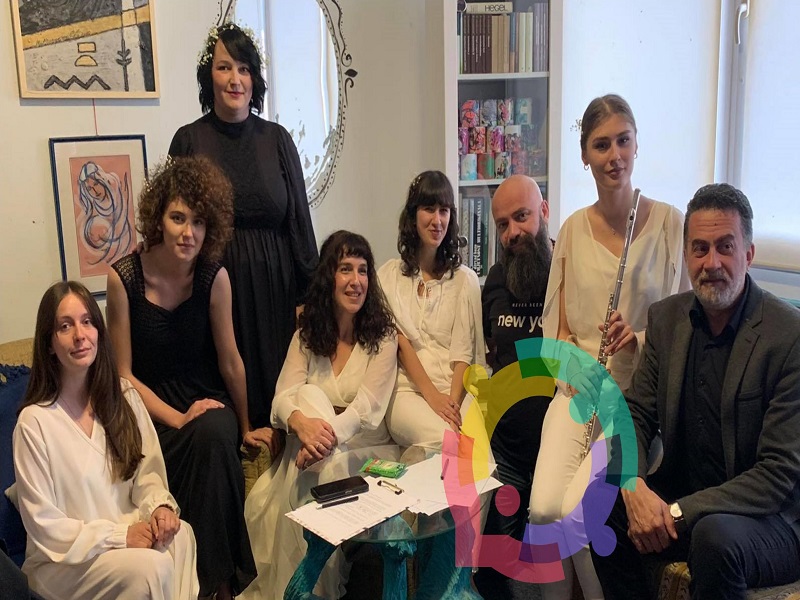Category: Blog Organizations: Galeria Aquarius , Alternativna , UNMIK Tags:
On the Ibar bridge, even words pass over the bridge. The words that were thought and felt by people from the period of the Federal Republic of Yugoslavia have been revived today by some new people, artists. This is an introduction to a "plot" that will probably have only infinity in duration. Under the slogan "Words as bridges", the first "ZaNa" Literature Festival was held in Mitrovica for the first time, as a kind of promotion of cultural cooperation between different ethnic communities.
During the Festival, poetry evenings, debates, murals and poetry books were organized. This year, Zana focused on gender issues with an emphasis on Mitrovica poets. As a result of these changes across the bridge, words found their refuge in a book of poetry printed in three languages.
Latif Berisha, Vladeta Vuković, Muhamed Kërveshi, Darinka Jevrić, are just some of the names of poets who created during the second half of the last century in Yugoslavia. Aleksandar Dundjerin and Fazli Hajrizi write about them in the book reviews.
In the introduction to the book, the main "culprit" and initiator of the festival, the director of the museum in South Mitrovica, Nora Prekazi-Hoti, states that the idea arose due to the need to explore the written word, to search for those people on the river, for different identities in our environment.
"Introducing language and lyric verse, getting to know themselves, as well as those who wrote their own stories about love and pain in the second half of the last century, the need gradually arose to understand the other in parallel," Nora wrote.
Zana in translation means fairies, but in reality Nora used them as a path to the most beautiful that elevates man and brings him closer to man. Love. It explains that diversity in a city like Mitrovica is an advantage and that it should unite people. The truth is authentic, according to her, and connecting Serbs and Albanians through culture is the best cure.
"There is a cure for everything in art and there is no bluffing, either you like what you do or you can't do it at all," she pointed out, adding that there is no difference in the poetry of Serbs and Albanians in the 1960s and 1980s.
"I don't even know what I expected, but I was surprised how much our writing style is the same, revolutionary women, hardworking, loving women," Nora revealed and announced the internationalization of this festival in the coming period.
"ZaNa will become an international festival with an audience, inspired by women, by publishing books and introducing the general public to our activities," she pointed out.
This year, Korona arranged all the events so that the audience was deprived of an immediate impression, and all the events were recorded and broadcast through other media, primarily RTK1 and RTK2 televisions.
On the other side of the bridge, in the northern part of Mitrovica, Miljana Dundjerin welcomed with words. On behalf of the Private Cultural Center Aquarius, which is celebrating five years of existence this year, she opened the doors of ZaNi and showed what unites her and Nora, respect for the man who creates and removes prejudices.
"Multiculturalism is in itself this city, and it is this city that dictates that we must be multicultural, and the biggest challenge is to remove prejudices and take the first step," the artist reminded, emphasizing that when people are big, we must not allow them to transcribes, gender, sex, number.
In the world of identity crisis, the most difficult thing is to show that identities are not in crisis, if we present and respect our uniqueness and diversity with them, and in that, this festival deserves support, because it strives for that.
"Festivals like this, where we recognize the art of both communities and cooperation based on that, get a new form of life," Miljana pointed out, adding that the key function in multiculturalism should not be assigned to anyone.
"Everything is based on the relationship of an individual to an individual, not society to society, and the moment when people as individual beings respect diversity in others, then there will be reconciliation, and everything else is artificial," Miljana pointed out.
Words like bridges from September to December this year, bridged all divisions and isolations. Nora and Miljana each in their own way contributed to reminding the south and the north of some long-gone times in which, as today, everything that is good in a person is loved.
"It's not the river that flows, it's the water, it's not time, it's us," and maybe that's where some art of life rests. Our ZaNe are Miljana and Nora, good fairies just warn that we must not forget who we are and where we are from. They are artists who remove all the ramps. With this festival, they managed to remind that beauty knows no boundaries and that it is pronounced the same - in all languages - the language of love.
Many poems are inspiringly written about life, and only some of the verses may inspire someone to read everything. Poetry will still conquer the world, and with words like this and women like this, every bridge is easy to cross.
Photo source: ZaNa Festival




